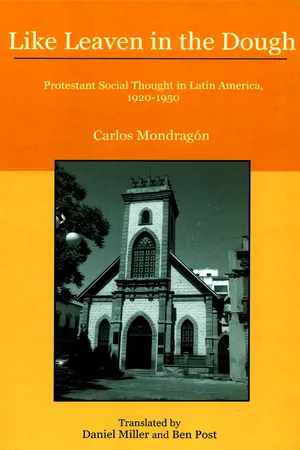
eBook - ePub
Like Leaven in the Dough
Protestant Social Thought in Latin America, 1920–1950
- English
- ePUB (mobile friendly)
- Available on iOS & Android
eBook - ePub
Like Leaven in the Dough
Protestant Social Thought in Latin America, 1920–1950
About this book
In Like Leaven in the Dough: Protestant Social Thought in Latin America, 1920-1950, Carlos Mondragón offers an introduction to the ideas of notable Protestant writers in Latin America during the first half of the twentieth century. Despite their national and denominational differences, Mondragón argues that Protestant intellectuals developed a coherent set of ideas about freedom of religion and thought, economic justice, militarism, and national identity. This was a period when Protestants comprised a very small proportion of Latin America's total population; their very marginality compelled them to think creatively about their identity and place in Latin American society. Accused of embracing a foreign faith, these Protestants struggled to define national identities that had room for religious diversity and liberty of conscience. Marginalized and persecuted themselves, Latin America's Protestants articulated a liberating message decades before the appearance of Catholic Liberation Theology.
Frequently asked questions
Yes, you can cancel anytime from the Subscription tab in your account settings on the Perlego website. Your subscription will stay active until the end of your current billing period. Learn how to cancel your subscription.
No, books cannot be downloaded as external files, such as PDFs, for use outside of Perlego. However, you can download books within the Perlego app for offline reading on mobile or tablet. Learn more here.
Perlego offers two plans: Essential and Complete
- Essential is ideal for learners and professionals who enjoy exploring a wide range of subjects. Access the Essential Library with 800,000+ trusted titles and best-sellers across business, personal growth, and the humanities. Includes unlimited reading time and Standard Read Aloud voice.
- Complete: Perfect for advanced learners and researchers needing full, unrestricted access. Unlock 1.4M+ books across hundreds of subjects, including academic and specialized titles. The Complete Plan also includes advanced features like Premium Read Aloud and Research Assistant.
We are an online textbook subscription service, where you can get access to an entire online library for less than the price of a single book per month. With over 1 million books across 1000+ topics, we’ve got you covered! Learn more here.
Look out for the read-aloud symbol on your next book to see if you can listen to it. The read-aloud tool reads text aloud for you, highlighting the text as it is being read. You can pause it, speed it up and slow it down. Learn more here.
Yes! You can use the Perlego app on both iOS or Android devices to read anytime, anywhere — even offline. Perfect for commutes or when you’re on the go.
Please note we cannot support devices running on iOS 13 and Android 7 or earlier. Learn more about using the app.
Please note we cannot support devices running on iOS 13 and Android 7 or earlier. Learn more about using the app.
Yes, you can access Like Leaven in the Dough by Carlos Mondragón, Daniel Miller,Ben Post in PDF and/or ePUB format, as well as other popular books in Theology & Religion & Christian Denominations. We have over one million books available in our catalogue for you to explore.
Information
Table of contents
- Translator’s Preface
- Acknowledgments
- Introduction
- 1 The Role of Religion in History
- 2 The Protestant Presence in Latin America
- 3 Heterodox Religious Thought
- 4 Freedom of Conscience and Religious Liberty
- 5 War and Peace
- 6 Protestantism and Society
- 7 Protestantism and National Identity
- 8 Conclusion
- Appendix A Individuals Mentioned in the Text
- Appendix B Three Letters from Miguel de Unamuno
- Appendix C Letter from Gabriela Mistral
- Appendix D Contributors to La Nueva Democracia
- Notes
- Bibliography